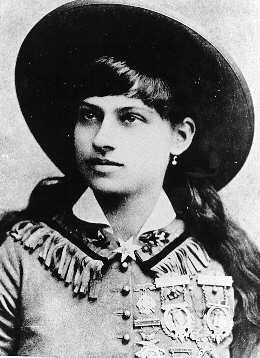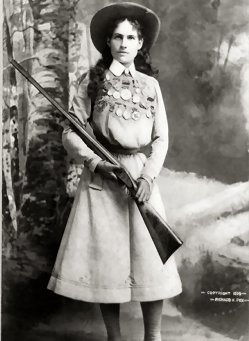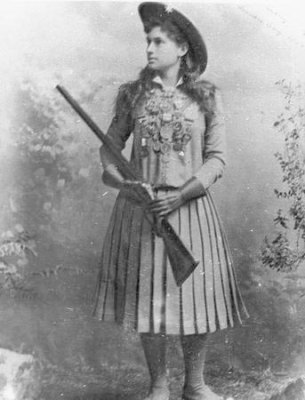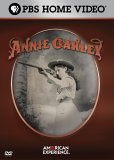| Reviews & Columns |
|
Reviews DVD TV on DVD Blu-ray 4K UHD International DVDs In Theaters Reviews by Studio Video Games Features Collector Series DVDs Easter Egg Database Interviews DVD Talk Radio Feature Articles Columns Anime Talk DVD Savant Horror DVDs The M.O.D. Squad Art House HD Talk Silent DVD
|
DVD Talk Forum |
|
|
| Resources |
|
DVD Price Search Customer Service #'s RCE Info Links |
|
Columns
|
|
|
American Experience - Annie Oakley
The extent of my knowledge of famed sharpshooter Annie Oakley's life came solely from watching Betty Hutton in Annie Get Your Gun, and if you know anything about Hollywood biographies, it's assured that 95% of that "biography" was outright fabrication. So what an enlightening experience it was to see PBS Home Video's American Experience presentation of Annie Oakley, narrated by actress Laura Linney. America's first female superstar, Annie Oakley endured a horrific childhood to become perhaps the most famous woman of her time - in a man's world. And she achieved that hard-won success and fame by staying true to her own beliefs, while remaining beguiling feminine.

The first fact about Oakley's life that came as a shock to me was the fact that she was born and raised a Quaker in Ohio - not the wild West. Fatherless at six, her family quickly went into debt, and lost their family farm. Her mother, unable to support Annie, sent her to the county poor house, where she was essentially "sold" to a farm family who treated her as a slave. Never referring to their real names later in life, Oakley always referred to these sadistic caretakers as, "the wolves." The documentary does a good job of conveying the unspoken horrors that were probably visited on Oakley for the two years she stayed with the family. Unable to endure any more punishment, she escaped to her home, only to be returned to the work house because her mother still could not afford to care for her. Finally, at 15, she was allowed to return home.
What happens next is quite astounding, considering the social mores of that Victorian era. Quite by accident, and with no training from anyone else, Oakley decided to teach herself how to shoot a shotgun, using her dead father's weapon. She quickly developed her innate talents, and proved to be a dead shot. She started to earn a living providing game for the local market - something women just didn't do back then. Certainly, real pioneer women did indeed hunt, but it was very unusual for a proper Quaker girl to go into business for herself, by excelling at a trade dominated by men.
One of the country's better sharpshooters, Frank Butler, was appearing in a variety act near Annie's home when she was put up by the county's farmers in a shooting contest against Butler. The 15-year-old handily beat the professional, and he was, according to the documentary, instantly smitten. They were soon married, and she joined Butler on the road - but not initially as part of the act. One fateful night, when Butler's partner was unable to perform, Oakley stepped in, and performed beautifully, much to the audience's delight. This was the formal start of her career, and quickly, she became a bigger attraction than her famous husband. The documentary brings up an interesting point here: Butler was not upset by this. He was a shrewd businessman, and very much in love with her, and he stepped aside in the act to become her assistant - a gender role switch that was highly unusual for the Victorian era.

The documentary also illustrates the shrewdness of Oakley's self-creation of her image. Evidently, she was quite aware that to be more appealing to the largely male audiences, she should appear as refined as possible on stage, creating a sexually-charged dichotomy of the innocent, sweet, demure young girl who wielded a shotgun like a man, never missing a target. Her popularity grew, and eventually she joined Buffalo Bill Cody's famed Wild West Show, were she came to outstrip his own popularity. Joining Cody's Wild West show (while occasionally taking breaks to try her hand at other ventures, such as plays and her own variety shows) allowed Oakley to travel all over Europe, where the "Wild West" shooter created a sensation, wowing the very cream of the European aristocracy. She would conquer the café society of Manhattan, as well, performing for sold out crowds for years. Despite an erroneous attack by the Hearst papers (who falsely reported that an Oakley impersonator, arrested on drug charges, was indeed Oakley), she fought for six years to defend her reputation - despite the fact that even though she won the lawsuits, she lost money doing so. To Oakley, who endured deep shame from her years with "the wolves," her reputation as an upstanding, Victorian lady was paramount to her.
What I found most fascinating about this particular documentary was the notion that America has always been an incredible breeding ground for larger-than-life characters who create their own identities and myths. I had always believed that Oakley originated from the west, that she really was some kind of pioneer woman who Cody discovered, and made famous through his Wild West show. And nothing could have been further from the truth. Her own story was much more miraculous: a physically and emotionally abused Quaker girl who discovered a God-given talent, and then exploited it to survive in an environment that by all rights, should have rejected her outright. My only complaint with this particular biography would be that that particular aspect of society wasn't discussed fully. She was accepted by the male-dominated world, because of her talents, and because she remained true to her femininity. A bitter rival at the time, sharpshooter Lillian Smith, did not attain the same fame as Oakley precisely because she didn't act like a lady. She swore, bragged, and hung around the rough cowboys - all behaviors of the Victorian age that were deemed totally unacceptable for women. Evidently, Oakley very calculatingly exploited her pretty, slim figure, and sweet, refined demeanor to please her audiences - male and female - giving the public an idealized vision of the proper Victorian lady. By all rights, despite her polished, sophisticated manners, she should have been dismissed as a serious performer because of her gender. But she wasn't; the male dominated world rightly acknowledged and admired her talents - talents that matched any man in the audience. That potentially interesting divergence from accepted, popular notions of an "intolerant" male-dominant society wasn't really explained or explored.
Still, that's a very small point in an otherwise fascinating portrait of woman every young girl in America should know about. I watched this with my young daughter, and she was utterly fascinated to see how far in the world Oakley went on her talents alone. It's an incredibly powerful message for young girls that unfortunately, still needs to be hammered home even today.

The DVD:
The Video:
The widescreen (it looks 1.85:1, to me, but it isn't stated on the box) presentation, enhanced for 16 x 9 televisions, is a crystal-clear image, particularly with the silky black and white original stills. It's a very good looking documentary.
The Audio:
The English 2.0 stereo mix is perfectly fine for this kind of documentary.
The Extras:
The only extra on American Experience: Annie Oakley is a gallery of six posters from Buffalo Bill Cody's Wild West show.
Final Thoughts:
There's a marvelous shot of Oakley used in the documentary, where she looks out at the camera, her eyes steady and direct. It's a hypnotic image when you see it in the documentary, and you can sense her steely determination beneath the otherwise calm, dead-shot eyes. There's quite a story that went into creating that penetrating gaze. Historians, professors and biographers such as Virginia Scharff, Shirl Kasper, Mary Zeiss Stange, R. L. Wilson, Don B. Wilmeth, Joy Kasson, Paul Fees, Elliott West, and Donald Fixico lend expert, interesting comments to director Riva Freifeld's fascinating documentary, American Experience: Annie Oakley. It's a telling look at a mythic American character that many may know by name, but not really by deed. And it's a particularly good program to show to any young person in your family; it's an empowering, enlightening history lesson. I highly recommend American Experience: Annie Oakley.
Paul Mavis is an internationally published film and television historian, a member of the Online Film Critics Society, and the author of The Espionage Filmography.


|
| Popular Reviews |
| Sponsored Links |
|
|
| Sponsored Links |
|
|
| Release List | Reviews | Shop | Newsletter | Forum | DVD Giveaways | Blu-Ray | Advertise |
|
Copyright 2024 DVDTalk.com All Rights Reserved. Legal Info, Privacy Policy, Terms of Use,
Manage Preferences,
Your Privacy Choices | |||||||













